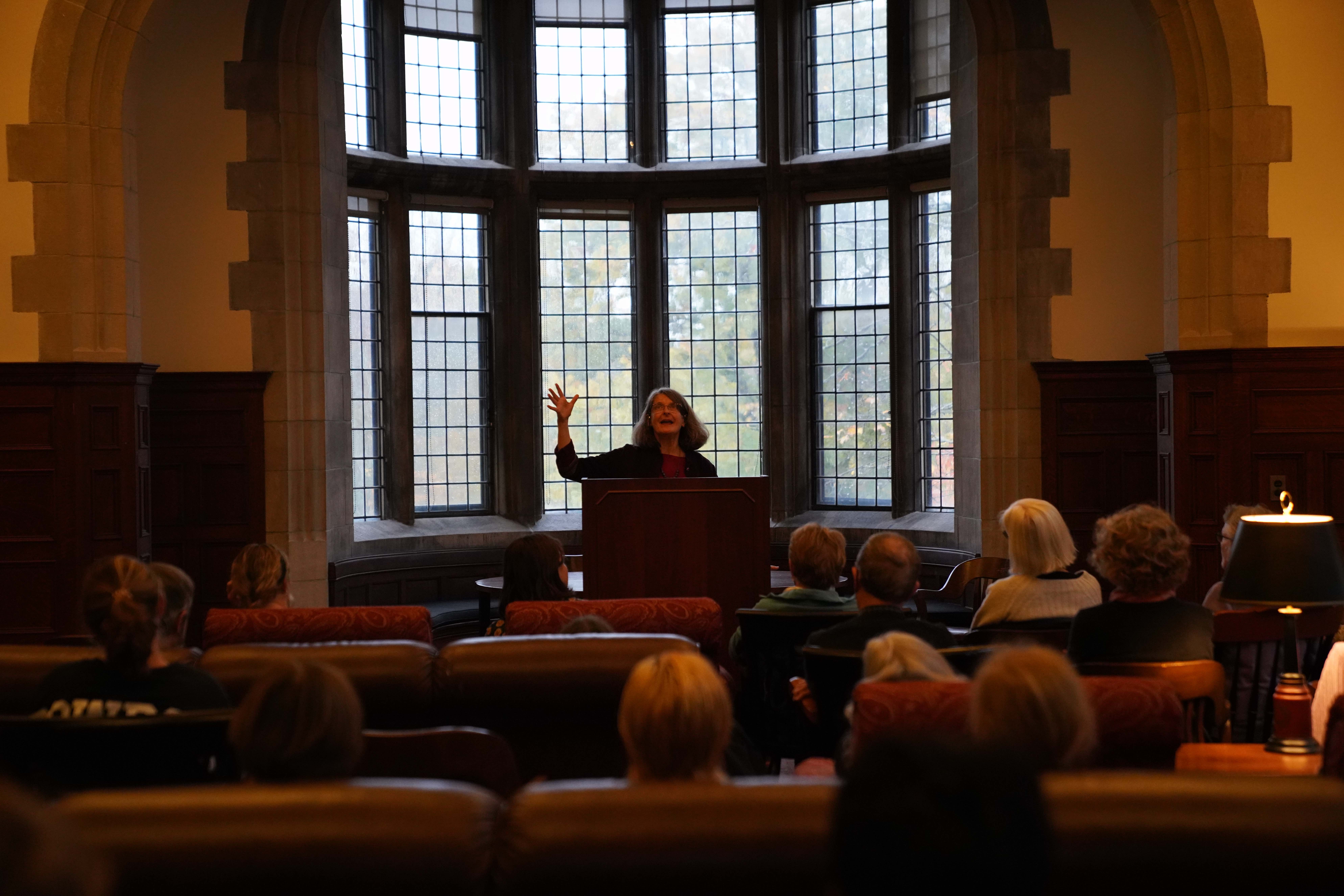Audience brought “In Deep” with Judith Sanders’s poetry reading
October 28, 2022
 Eliza Rhee
Eliza RheeOn Monday afternoon, members of the community gathered in the Thomas F. Shannon Room of Hubbard Hall to attend a reading of selected poems by Judith Sanders, an award-winning poet and former visiting professor at Bowdoin. Her performance, which was sponsored by Lectures and Concerts, the English Department, the Bowdoin Marine Science Semester and the Environmental Studies Program, included poems from her newly-published book “In Deep.” Her whimsical and engaging performance was interspersed with energetic bursts of song and frank quips on motherhood, travel, womanhood and life more broadly.
Audience members found Sanders’s performance full of intense energy and humor, her passion translated through every word and gesture. She added her unique flair and motions to poems such as, “68 Dodge Coronet,” “The Bra Fitters Questionnaire” and “Feeding the Horses at Crystal Spring Farm,” keeping her audience engaged from start to finish.
“I loved the way she performed the pieces,” visitor Lily Clurman said. “The images she conjured were really vivid: being on a bus in Italy or walking through a wood full of crunchy leaves in fall. Each poem she read to us had a storyline and even the ones that were really short had an element of narrative change, which helped me stay more engaged.”
Sanders addressed many issues through her poetry—from the objectification of women and the pains of growing up, to gun violence and the struggles of parenthood. Even her saddest poems seem to be tinged with hope, emphasizing the joy that hides within life and the lessons we can all learn from growing and changing.
During the Q&A section that followed the reading, Sanders explained how she developed her animated reading style.
“I do have an acting background, so I bring that out,” Sanders said. “I think I get tired of going to poetry readings where there’s a drone voice, and then you can’t remember what you heard afterward.”
Sanders discussed her writing process and her evolution as a poet while answering another question.
“I wrote these poems just because I needed to and without any expectation that anybody else would ever read them, much less that they would be published or that they would be heard,” Sanders said.
She addressed struggles as a modern writer and explained how she carves time out of her day to devote herself to writing.
“For the poems you heard, I have to generate lots and lots and lots of awful material,” she said with a laugh. “Then I winnow it down to the few lines that you hear in the poem. Sometimes it takes years for me to really figure out what a poem is about.… Since I’ve begun reading them out loud, I have discovered new things in them that I didn’t know were there when I created them in silence.”
Sanders offered advice to writers struggling with deadlines and distractions.
“We live in the age of distraction,” Sanders said. “I wonder how Shakespeare would have written if he’d had a cell phone at his elbow. During your writing time you are like a surgeon performing an operation or a priest saying mass. You wouldn’t interrupt the surgeon holding the knife, would you? You wouldn’t interrupt the priest raising the chalice.”
Many poems in “In Deep” can be classified as “eco-poems,” as they center around nature and bring attention to environmental issues and ethics. Associate Professor of English Elizabeth Muther, who organized the event, brought Sanders to her class Maine Writers and the Environment to discuss her work.
“I wanted to bring Judith Sanders to campus to do a reading because I’ve been following her work for years,” Muther wrote in an email to the Orient. “She is an original, comic and profound poet—with a tremendous range in voice, tone and genre—and her writing often moves me to laughter, tears or shivers of recognition.”
Her description of the joys and sorrows of the human condition left some members of the audience with a newfound appreciation for the small things in life.
“I was so charmed,” local Maine author and audience member Bunny McBride said. “[The poems] are so tender, they’re so everyday life … filled with little details that you might miss if you weren’t a poet—if you weren’t an observer—and she’s such an observer.”

Comments
Before submitting a comment, please review our comment policy. Some key points from the policy: